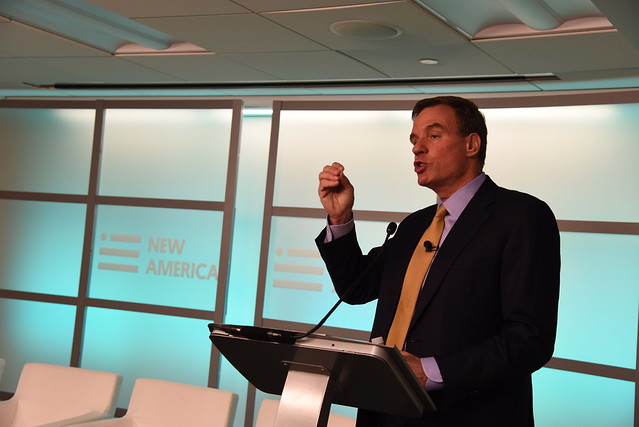In the News
Virginia Business: The future of work
Apr 04 2016

Sen. Warner delivers remarks at the New America Foundation in June 2015 on the “gig-economy”
By: Jessica Sabbath
U.S. Sen. Mark R. Warner is the first to admit capitalism has served him well.
After a couple of failed startups, he earned millions in the 1990s as an early investor in the cellphone industry during its explosive growth. (He was featured on the cover of Virginia Business magazine in July 1994 in a profile about his technology investments.)
And yet, he believes capitalism’s focus on short-term returns could be hampering the country’s long-term economic growth. “Do we rethink some of our incentives in capitalism?” Warner asked during a sit-down interview with Virginia Business in late February. “In capitalism today, if you invest in a piece of equipment, it’s an asset. If you invest in a human being in terms of pay or training, that’s a cost. Is there a way to rebalance that a little bit?”
Warner, who is serving his second term as a senator, says statistics show as many as 60 percent of Americans couldn’t afford an unexpected $400 expense. “[We’re] at a real uncertain time,” Warner says, “and the best evidence of that is the political campaign that is playing out right now where people go to the extremes.”
By the end of the year, Warner hopes to outline a policy agenda to help redefine incentives in what he calls “Capitalism 2.0.” He points to ongoing initiatives, such as investor Paul Tudor Jones’ JUST Capital nonprofit organization, which grades companies on measures including sustainability and investment in employees.
The rise of the “gig economy” is another economic shift Warner is watching. He sees a dramatic shift of people working in the on-demand economy, such as drivers for ride-hailing company Uber.
“What is the social contract going to be in the 21st century?” Warner asks. “Our current system basically says there are two classifications of work: You’re an independent contractor, or you’re an employee, and there are certain freedoms or responsibilities that come with each of those classifications.
“I think there probably is going to need to be either a third or fourth-level classification, and there may be a whole ability to create a set of benefits that will be more portable with you,” he says.
Warner is the honorary co-chair of the yearlong Future of Work Initiative of the Aspen Institute, an educational and policy studies organization in Washington. The initiative’s goal is to find concrete solutions to ensure that workers in the on-demand economy have some sort of safety net. The other co-chairman of the program is Mitch Daniels, a former Republican governor from Indiana.
To help get a better handle on the “gig economy,” Warner has asked the Department of Labor to include questions about the on-demand workforce in its May 2017 Bureau of Labor Statistics’ Contingent Worker and Alternative Work Arrangement Supplement (CWS), part of a survey the government uses as its key source for workforce data.
In addition to gauging the economy of the future, Warner is focusing on improving what he sees as a major obstacle to economic growth in the country — student debt.
To that end, Warner has partnered with Republicans to introduce a series of bills, including legislation that would allow companies to offer as an employee benefit the ability to pay down student debt pretax.
Another bill would streamline the process for students to enroll in income-based repayment for federal loans. He also believes federal Pell grants, available to low-income college students, also should be offered to high school students taking dual-enrollment classes. “Even in our public universities in Virginia, the average student comes out with $26,000 of debt,” says Warner. “I think that has huge economic ramifications well beyond the students and their families.”
Warner is also encouraging Virginia companies to take advantage of current growth industries.
Virginia should be primed to manufacture and test unmanned systems, or drones, says Warner.
The senator serves on the Virginia Unmanned Systems Commission. Warner has long advocated that Virginia businesses recognize the industry’s growth opportunity. He also is encouraging the Federal Aviation Administration to finalize rules governing drone usage. “It’s going to be a huge area, and with the military, with activities at [Virginia Tech] and other institutions, we really have a chance to be a leader,” he says.
The cyber industry represents another economic opportunity for Virginia, says Warner, who is a member of the U.S. Senate Select Committee on Intelligence. Warner also sees the need to provide more resources in combatting cyber attacks.
“If you think of traditional military, our national defense, we spend money on ground troops, on Navy, on Air Force. Cyber is almost a whole new domain, and whether they’re criminals, or whether they’re bad guys, they don’t have to have an army. They don’t even have to have a terrorist with a bomb. They can attack us from an office in Shanghai, an office in Kiev or an office or a computer in Morocco.”
During the ongoing battle between the FBI and Apple over encryption, Warner and Republican U.S. Rep. Michael McCaul have introduced a bill to create a commission of legislators, law enforcement and industry representatives to make recommendations to maintain privacy and digital security.
Virginia Business staff discussed a wide range of issues with Warner at the end of his weeklong tour around Virginia.